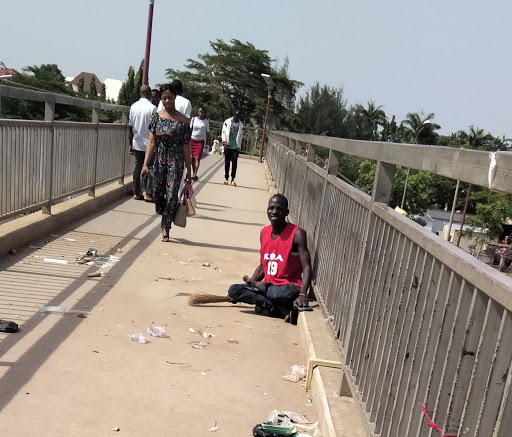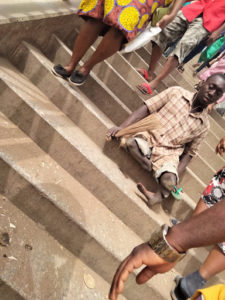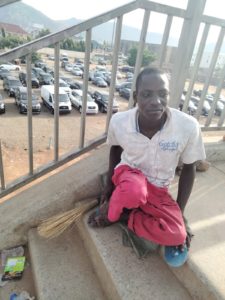Physically Challenged Persons Who Sweep Pedestrian Bridge In Nigeria’s Capital
Two physically challenged persons in Abuja, Nigeria’s capital, have taken to sweeping a pedestrian bridge for the past 10 years instead of begging.

By 8 a.m. every day, Ibrahim Bello, 28, is at the peak of a pedestrian bridge, moving on a makeshift skateboard to sweep dirt and leftovers by vendors and pedestrians the previous night.
Like one whose life depends on the cleanliness of the bridge, Bello, who was crippled at infancy by poliomyelitis, is a self-appointed environmental officer that ensures that the Galadimawa pedestrian bridge, along Kubwa expressway in Abuja, Nigeria’s capital, does not become a refuse dump.
As early as 6 a.m. after his morning prayer, Bello journeys from Zuba, an outskirt community in Abuja, to Galadima, to sweep the pedestrian bridge which is about 24 metres long. He climbs the staircase with his crutches, although, with a lot of difficulties.
For 10 years, Bello, and his friend Usman, with whom he runs shift, have kept the bridge clean.
“I started sweeping here around the time of Goodluck’s regime. It’s been like 10 years, I come here every day as long as I am okay. We always sweep here because those people hired to sweep the road don’t sweep here,” Bello told HumAngle during an encounter.
Leaving begging to sweep the bridge
Across Abuja, people with disabilities —many of them, polio victims— have taken up the responsibility of sweeping pedestrian bridges. They are not getting the attention they deserve from the authorities but Bello says that he is delighted that users always smile at him and also tip him when he sweeps the bridge.

Before August 25, 2020, when Nigeria was officially declared polio-free, the country accounted for more than half of all global cases of polio. Bello and Usman were among numerous victims.
Nigeria was the last polio-endemic country in Africa and was officially certified polio-free after marking three consecutive years since the last case was identified.
Bello, a citizen of Zamfara, Northwest Nigeria, is the first of six children.
Bello said he came to Abuja in search of a better life in 2008 but after trying his hands on various menial jobs and petty trades which failed due to challenges attached to his disability, decided to start begging.
He was joined in the community service by Usman, 26, from Katsina State in Northwest Nigeria in 2013.
“I tried doing small business in my area but it’s not easy and I don’t have anyone here to help me go to the market to buy what to sell,” he narrates his ordeals.
“So I started begging but after a while, I said to myself that I can be useful by sweeping instead of just begging.”
Although he says he has younger siblings, a widowed mother to cater for; the urge to contribute to his society, he says, led him to abandon begging for sweeping the bridge.
For Bello who dropped out of school when he was in Junior Secondary School (J.S.S 1), his desires are for his younger siblings to be educated and for him too to go back to school. “My five younger brothers and my mother are in Zamfara and I pay their school fees.”
On a daily basis, he says proceeds from tippings for sweeping the bridge can be as high as N4000 ($10).

Despite his challenges of boarding vehicles to get to the Galadima pedestrian bridge, Bello says he is always looking forward to adding value to society and feels more recognised and appreciated when people smile at him and give him money.
“I always want to come here, except I am sick, but as long as I am okay, I always come out, having people smile at me and give me something makes me feel like I am seen and acknowledged,” he said to HumAngle.
It takes four hours to sweep the bridge
The duo take turns sweeping the bridge; while Bello comes in the morning, Usman takes the afternoon shift to sweep the bridge and it takes them both about four hours rolling on their makeshift mobility equipment to sweep across the bridge.
“It takes us four hours to sweep the bridge because people are passing and we don’t want to sweep on them, when it rains it takes longer because we want to sweep out the water to ensure that the bridge is dry,” they told HumAngle.
Arrested twice by AEPB over alleged begging offence
Bello and his friend, Usman, have been arrested twice by the Abuja Environmental Protection Board (AEPB), the government agency in charge of arresting beggars and hawkers.
The agency alleged that they were begging under the guise of sweeping the bridge.
“The last time they arrested me and my friend, it’s only God that saved us. We slept there for one night,” he shares his ordeals.
He admitted that he knew why they have been caught but he says it’s better than the option the AEPB offers.
According to Kaka Bello, Director of Monitoring and Enforcement at AEPB, when beggars are caught, they are taken to a vocational school in Bwari where they are taught skills that would lead them to a meaningful life.
But Bello says the school is like a prison and people who are not fortunate enough when thrown in there are treated “like animals.”
“Some of my friends have been taken there, when they came out I couldn’t recognize them anymore. They feed once a day and the living conditions are not okay. Anyone that stays there for two weeks, when they come out they look like they have been starved for a year,” Bello laments.
Kaka, however, maintained his position on the side of the law, saying beggars pose a danger to both themselves and the society, and some criminal elements hide under the guise of begging to cause harm to innocent people.
“Let’s leave sentiments aside, begging on the road is a risk, these people are endangering their lives, they can be knocked down by vehicles,” Kaka said.
“We are only trying to help them by taking them off the streets. We have a vocational school in Bwari but most times they refuse to stay there and learn something, they prefer begging.”
“It’s not in my contract to sweep the pedestrian bridges”
When HumAngle contacted the contractor in charge of cleaning the Muhamadu Buhari way popularly known as Kubwa express, he insisted that sweeping the pedestrian bridge was not part of his contract.
“It’s not my job, the bridge is upright? What my contract says is that I should sweep the roads and not the pedestrian bridge. If I do that, it means I just want to help, but now that you have mentioned it, I can tell the supervisors to tell the sweepers to help out,” the contractor who gave his name simply as Steven, told HumAngle.
Asked how people living with disabilities who have decided to contribute to their society can be drafted into the company’s staff process and be paid for their services, Steven, whose cleaning company is ESI Cleaning Services said “I will have to speak with my director and see if that is possible, I don’t have such powers.”
Meanwhile, David Anyaele, Executive Director, Centre For Citizens With Disability (CDD) whose organisation caters to the needs of persons with disabilities, said he had never received a complaint from anyone about any arrest or maltreatment.
According to him, the law stipulates that all public organisations are to reserve at least 5 per cent of employment opportunities for persons with disability.
“I think one should find out if employing people with disability by the AEBP and the sweeping contractors is part of their arrangements,” Anyaele said.
“The law clearly states that there should be no discrimination in the employment process, it is open to all including people with disability.”
“We advocate for all-round inclusion and if and when we get any complaint we take it up. And I assure you that if we get any complaint, written or oral we would talk it up,” he added.
In 2019, Nigerian President Muhammadu Buhari signed into law, the Discrimination Against Persons With Disabilities (Prohibition) Act 2019 with the objectives of achieving full integration of persons with disabilities into the society and establishing a National Commission for Persons with Disability to cater for their socio-economic rights.
The Act generally reaffirms the equal status that persons with disabilities enjoy with persons without disabilities under the laws. It also creates mandatory provisions for preserving that equality and ensuring that persons with disabilities benefit from a level playing field as far as is possible.
We appreciate what they do
A daily pedestrian who identified himself as Joseph told HumAngle that he is most impressed with the smile on Bello’s face every time he sees him and his friend on the bridge.
This act has earned Bello a place in Joseph’s daily budget.
“Every time I pass here in the morning, I always see him, listening to music and joyfully sweeping. Because of this, I decided I will be giving him something every day, I am happy with what he does,” he said.
Another user, Evelyn, also said that even on days when she doesn’t want to give, Bello’s enthusiasm always gives her a change of heart.
Support Our Journalism
There are millions of ordinary people affected by conflict in Africa whose stories are missing in the mainstream media. HumAngle is determined to tell those challenging and under-reported stories, hoping that the people impacted by these conflicts will find the safety and security they deserve.
To ensure that we continue to provide public service coverage, we have a small favour to ask you. We want you to be part of our journalistic endeavour by contributing a token to us.
Your donation will further promote a robust, free, and independent media.
Donate HereStay Closer To The Stories That Matter




